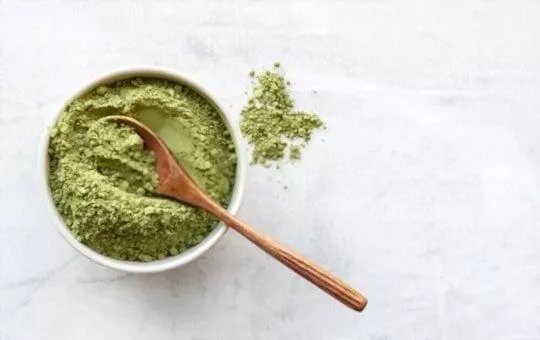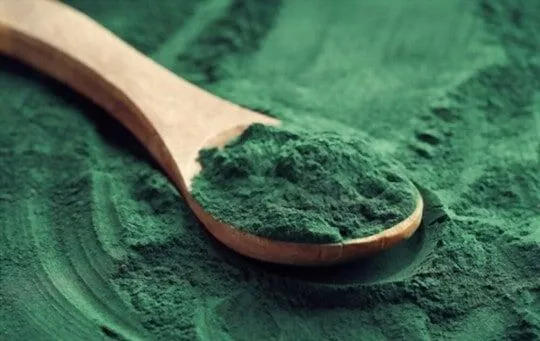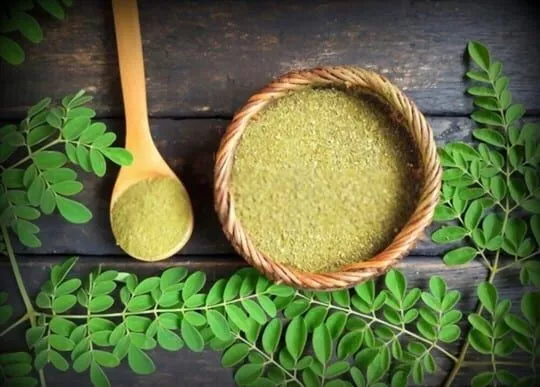If you’re a fan of Japanese cuisine, then you’re probably familiar with matcha powder.
This vibrant green powder is made from ground green tea leaves and is a common ingredient in traditional Japanese tea ceremonies.
However, if you’re unable to find matcha powder at your local grocery store or if you’re looking for a more affordable alternative, there are several substitutes that you can use instead.
In this article, we’ll be discussing the 5 BEST substitutes for matcha powder.

We’ll be looking at ingredients that have a similar taste and nutritional profile to matcha powder, so you can still enjoy the benefits of this superfood without breaking the bank.
Whether you’re making a matcha latte or adding it to your favorite baked goods, these substitutes are sure to satisfy your cravings.
So, without further ado, let’s dive into the world of matcha powder substitutes and find the perfect ingredient for your next recipe!
1: Green Tea Powder
Green tea powder, also known as matcha iri genmaicha, is made from roasted brown rice and green tea leaves. It has a similar taste and texture to matcha powder, making it a great substitute for those who don’t have matcha on hand.
When using green tea powder as a substitute for matcha, keep in mind that it is less potent and has a milder flavor than matcha. You may need to use more of it to achieve the same level of flavor and color in your recipes.
Green tea powder can be used in a variety of recipes, including smoothies, lattes, and baked goods. It can also be used as a seasoning for savory dishes such as rice and noodles.
2: Spirulina Powder

This blue-green algae is packed with nutrients and antioxidants, making it a great addition to any diet.
It has a slightly earthy and seaweed-like taste, which may not be for everyone, but it can be a great option for those who enjoy the taste or are looking for a more savory flavor profile.
Like matcha powder, spirulina powder can be easily added to smoothies, juices, and other drinks. It can also be used in baking and cooking, adding a pop of color and a boost of nutrition to your favorite recipes.
One thing to keep in mind when using spirulina powder is that it may not have the same caffeine content. Matcha powder contains caffeine, which can provide a boost of energy and focus, while spirulina powder does not.
However, spirulina powder does contain other energizing nutrients, such as iron and B vitamins.
3: Wheatgrass Powder
Wheatgrass powder is a popular alternative to matcha powder because it is also a green powder that is rich in nutrients. It is made from the young shoots of the wheat plant and has a slightly sweet taste. Wheatgrass is a good source of vitamins A, C, and E, as well as iron, calcium, and magnesium.
When using wheatgrass powder as a substitute for matcha powder, keep in mind that the taste will be slightly different. Wheatgrass has a milder taste than matcha and is not as bitter. However, it is still a good choice for adding a green color and nutritional benefits to your recipes.
Here are some ways to use wheatgrass powder as a substitute for matcha powder:
- Add a teaspoon of wheatgrass powder to smoothies or juices for a boost of nutrients.
- Use wheatgrass powder in baking recipes that call for matcha powder, such as muffins or cakes.
- Make a wheatgrass latte by mixing wheatgrass powder with milk and sweetener of your choice.
4: Moringa Powder

Moringa powder is another excellent substitute for matcha powder. It is made from the leaves of the moringa tree, which is native to India and other parts of Asia. Moringa powder has a slightly earthy taste, which makes it a great alternative to matcha powder in smoothies and other drinks.
One of the main benefits of using moringa powder instead of matcha powder is that it is more affordable. Moringa powder is also rich in antioxidants, vitamins, and minerals, making it a great choice for those who want to boost their overall health.
When using moringa powder as a substitute for matcha powder, keep in mind that it has a slightly different taste and texture. Moringa powder is not as bitter as matcha powder, so you may need to adjust the amount of sweetener you use in your recipes.
Here are some ways you can use moringa powder as a substitute for matcha powder:
- Add it to your smoothies for an extra boost of nutrients
- Mix it with hot water and honey for a healthy tea
- Use it in baking recipes that call for matcha powder
Overall, moringa powder is a great alternative to matcha powder for those who want to enjoy the health benefits of green powders without breaking the bank. Give it a try and see how it works for you!
5: Culinary Grade Matcha Powder
Culinary-grade matcha powder is the fifth substitute for matcha powder on our list. It is a lower-grade matcha powder that is perfect for baking, cooking, and other culinary purposes.
It is typically less expensive than ceremonial-grade matcha powder, which makes it an ideal substitute for those on a budget.
Culinary-grade matcha powder is made from leaves that are harvested later in the season, resulting in a coarser grind and a slightly bitter taste. While it may not have the same delicate flavor as ceremonial-grade matcha powder, it is still a great substitute for recipes that call for matcha powder.
When using culinary-grade matcha powder as a substitute, keep in mind that it has a stronger flavor than ceremonial-grade matcha powder.
This means that you may need to use less of it in your recipe to avoid overpowering the other flavors. It also has a slightly different color than ceremonial grade matcha powder, so your finished product may not have the same bright green color.
Conclusion
Matcha powder is a unique ingredient that can add a distinctive flavor and color to various dishes and beverages. However, it may not always be available or affordable, and some people may not like its taste or caffeine content. The good news is that there are several substitutes for matcha powder that can offer similar benefits and versatility.
In this article, we have explored five of the best substitutes for matcha powder, including green tea powder, spirulina powder, wheatgrass powder, moringa powder, and chlorophyll drops. Each of these substitutes has its own advantages and drawbacks, depending on the recipe, preference, and health goals of the user.
Green tea powder is the closest match to matcha powder in terms of flavor and color, but it may have lower quality or potency. Spirulina powder is a superfood that can boost the nutritional value of the dish, but it may have a strong taste or odor.
Wheatgrass powder is a detoxifying agent that can add a grassy flavor and color to the dish, but it may not dissolve easily or blend well. Moringa powder is a nutrient-dense ingredient that can enhance the health benefits of the dish, but it may have a bitter taste or aftertaste. Chlorophyll drops are a concentrated form of green pigment that can add a vibrant hue to the dish, but they may not be widely available or affordable.
Ultimately, the choice of alternative to matcha powder depends on the specific needs and preferences of the user. It is important to experiment with different substitutes and recipes to find the best match for your taste buds and health goals. By using these substitutes, you can still enjoy the benefits of matcha powder without breaking the bank or compromising your taste buds.

The 5 BEST Substitutes for Matcha Powder
Ingredients
- Green Tea Powder
- Spirulina Powder
- Wheatgrass Powder
- Moringa Powder
- Culinary Grade Matcha Powder
Instructions
- Pick your favorite substitute from the list above.
- Follow cooking directions for your selected substitute with the proper ratio of ingredients.
Jenny has always been passionate about cooking, and she uses her platform to share her joy of food with others. Her recipes are easy to follow, and she loves giving tips and tricks to help others create their own unique culinary creations.

